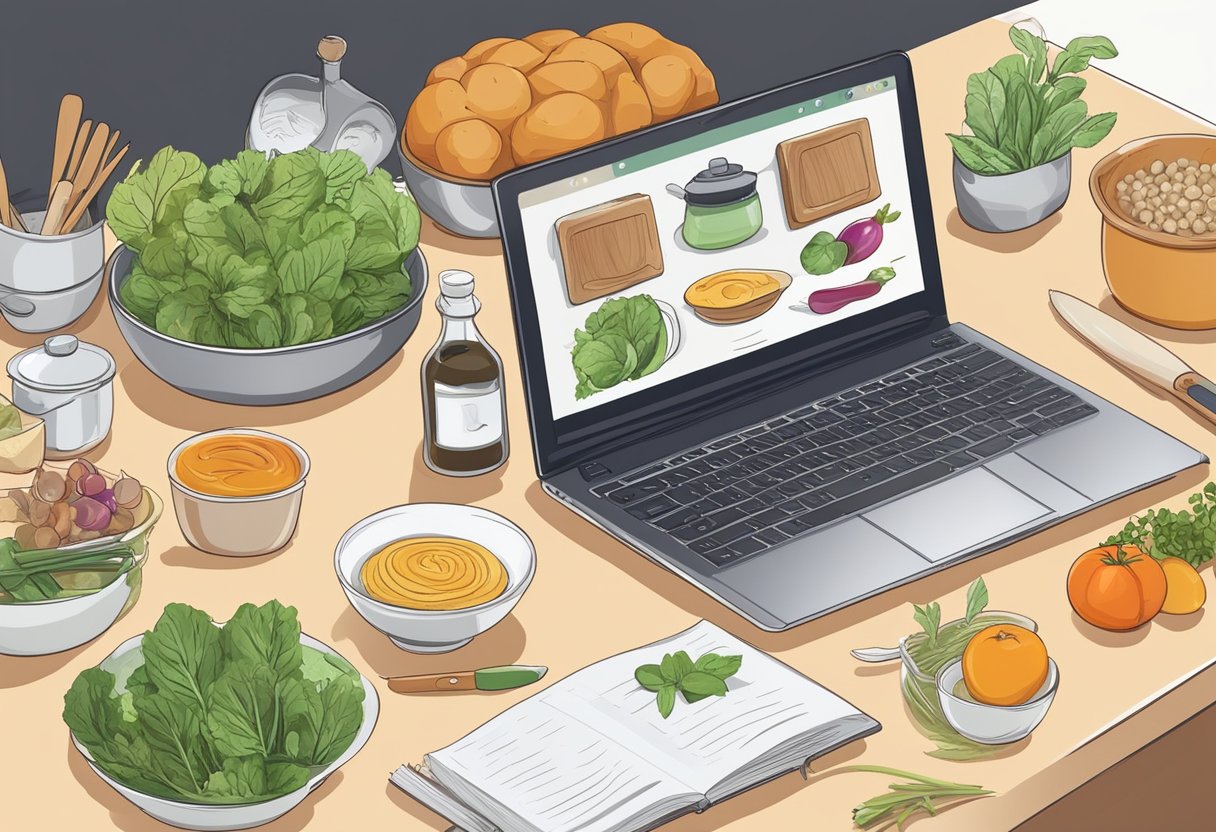

- Directory
- Recent
-
Featured
-
Featured
- Recent
-
- Programs
- Digital Nomad
- Side Gigs
- Resources
Select Page
![]() 10 people find this post amazing!
10 people find this post amazing!

Embracing the digital era, the culinary world has made a monumental shift, bringing the art of cooking right into the comfort of one’s home through online cooking classes. These virtual lessons offer the flexibility to learn and master the culinary arts no matter one’s location or schedule. They cater not only to budding home cooks but also to those seeking to expand their palates and explore international cuisines from their own kitchens.
Online cooking classes have opened the door to culinary education beyond the traditional classroom setting, allowing renowned chefs to share their expertise with a global audience. This approach to learning encourages the establishment of a community where both families and food enthusiasts can engage in shared cooking experiences. The various platforms hosting these classes offer an assortment of formats, from on-demand videos to live sessions, ensuring there is a class suited to everyone’s learning style and culinary interest.
Online cooking classes have revolutionized the way culinary enthusiasts from all levels can enhance their cooking skills. With the comfort of learning from home, these classes offer a plethora of cuisines and techniques tailored to a variety of preferences and skill sets.
One standout platform is MasterClass, where aspirants can learn from celebrity chefs like Gordon Ramsay. Their high-quality production offers an immersive experience that feels almost like being in the kitchen with the stars themselves.
Skillshare also provides a trove of cooking courses catering to a range of skill levels and culinary interests. The platform encourages hands-on learning where students can cook alongside instructors.
On Udemy, learners find a vast selection of courses with a focus on specific skills or dishes. Here, one can find classes on everything from knife skills to full-course meal preparation, taught by experienced chefs and culinary professionals.
Moreover, these platforms often include community features which allow students to share experiences and tips, further enhancing the learning process. The online format breaks geographical barriers, enabling individuals to access culinary wisdom from around the globe without leaving their kitchen.
When engaging in online cooking lessons, an exciting aspect is the opportunity to explore diverse cuisines from the comfort of one’s own kitchen. These culinary adventures introduce learners to a wide array of flavors, techniques, and cultural histories associated with various international dishes.
By participating in online cooking classes with international chefs, home chefs gain direct access to authentic cooking methods and ingredient insights. These lessons offer tailored guidance in real-time, ensuring that even beginners can achieve success with each new recipe attempted.
When embarking on online cooking lessons, one will quickly learn that proficiency in the kitchen is built upon a foundation of essential skills and techniques. To start, knife skills are paramount; they are the cornerstone of culinary efficiency and safety. Learners will master basic cuts such as the dice, julienne, and chiffonade, moving on to more advanced techniques like filleting fish or breaking down a chicken.
Table 1: Basic Knife Cuts
| Cut Type | Description | Common Use |
|---|---|---|
| Dice | Uniform cube-shaped pieces | Soups, salads |
| Julienne | Matchstick-shaped pieces | Stir-fries, garnishes |
| Chiffonade | Finely shredded or sliced leafy vegetables | Garnishing dishes |
Cooking classes will typically include instruction on how to select the right knife for each task and maintain its sharpness for optimum performance.
Another key area is the art of bread baking. This skill transcends mere mixing and kneading; it involves an understanding of how ingredients like yeast and gluten work together to create various types of bread. Baking bread is often seen as a daunting task, but with guided lessons, even novices can produce fresh and delicious loaves.
Lastly, a broad array of basic cooking skills such as roasting, steaming, and sautéing are taught, enabling budding chefs to handle a variety of ingredients and recipes. Online courses aim to empower learners with techniques they can apply to a multitude of dishes, ensuring they are well-prepared to tackle complex recipes with confidence.
The online culinary education landscape has been significantly enriched by the involvement of renowned chefs. They carry a wealth of experience and notoriety which can inspire and attract a wide audience to e-learning platforms. Chefs like Gordon Ramsay and Dominique Ansel have partnered with MasterClass to share their culinary secrets, furthering the legitimacy and appeal of virtual cooking courses.
| Expert Chef | Contribution to E-Learning |
|---|---|
| Gordon Ramsay | Comprehensive video lessons |
| Dominique Ansel | Specialist pastry techniques |
| Wolfgang Puck | Culinary arts mastery |
| Alice Waters | Sustainable cooking practices |
Each chef brings their unique philosophy to the online learning space. For instance, Alice Waters advocates for sustainable cooking practices, demonstrating not just technique, but also instilling values that are important in today’s culinary world. Similarly, the illustrious pastry skills of Dominique Ansel train students in the art of French desserts.
These classes go beyond mere recipes; they are a glimpse into the minds of chefs who have reached the pinnacle of culinary achievement. With lifetime access to such classes, students can continuously return to the material, honing their skills at their own pace.
E-learning platforms diversify the impact these chefs can have, opening doors to those who might never have the opportunity to learn from such esteemed figures in the culinary world. It transforms the one-way transmission of cooking shows into an interactive experience. Involvement of expert chefs in e-learning does not only democratize high-quality culinary education but also sets a standard for professional and aspirational cooking from the comfort of one’s home.
Cooking together offers a unique blend of collaboration and learning, making it an ideal activity for family bonding, community engagement, and group events such as date nights. It’s not just about the food, but the shared experience that fosters relationships and builds memories.
Family: Engaging in the kitchen as a family can be educational and fun. It’s a chance for kids and adults to learn about new ingredients, techniques, and the cultural aspects of cooking. Many online cooking classes cater to families looking to expand their culinary horizons together.
Community: Cooking classes can act as social gatherings, strengthening community ties. Community centers and online platforms often offer group cooking classes where individuals can enjoy the camaraderie of cooking with others while learning new recipes.
Date Nights: For couples, cooking can be a romantic and cooperative experience. Online platforms sometimes provide specialized cooking classes tailored for date nights, aimed at creating a cozy, interactive environment.
Group cooking classes, whether they’re for family, friends, or the larger community, are excellent ways to connect and engage with one another. These classes are not only about producing a meal but also about the joy of learning and sharing in an experience that nurtures togetherness and community spirit.
Online cooking classes have gained popularity, allowing learners to improve their culinary skills from the comfort of their home. These classes come in various formats and are hosted on different platforms, catering to the diverse needs of culinary enthusiasts.
Live Interactive Classes: Platforms like Zoom facilitate real-time interaction between instructors and participants. Chefs can offer live demonstrations, answer questions, and provide feedback as participants cook along in their kitchens.
Pre-Recorded Lessons: For those who prefer learning at their own pace, many cooking platforms offer pre-recorded video lessons. These can be watched at any time, providing flexibility for busy schedules.
Cooking Experience Platforms:
Cooking Class Aggregators:
Class Formats:
Whether participants are looking to sharpen their knife skills or explore international cuisines, online cooking classes offer a plethora of options to suit any aspiring chef’s needs. The key is finding the right platform and format that matches one’s learning style and culinary goals.
When looking for gifts that will delight culinary enthusiasts, online cooking classes stand out. They provide an informative and interactive experience, tailored to the interests and skill levels of the receiver. Options range from beginner-friendly lessons to advanced courses led by renowned chefs.
Popular Online Cooking Classes:
For those who prefer a more personalized approach, a private cooking class may be the ideal choice. Such classes allow for tailored instructions and one-on-one interactions with professional chefs. They can be held in the comfort of the gift receiver’s kitchen or any other preferred location.
Gift Selection Tips:
A cooking class can enrich a food lover’s life with new skills and tasty experiences. It’s not just a gift; it’s an invitation to explore gastronomy and enhance their culinary journey.
For culinary enthusiasts looking to expand their skills beyond the basics, specialty cooking classes present an exciting opportunity. These classes cater to specific dietary preferences and interests, offering a more tailored learning experience. They can range from vegan cooking classes that introduce plant-based recipes and substitutes, to lessons focusing on gluten-free cooking, helping those with celiac disease or gluten sensitivity to prepare safe, delicious meals.
Vegan Cooking Classes:
Gluten-Free Cooking Classes:
Another specialty that has gained popularity is bartending. Online bartending classes teach students how to mix classic cocktails and create new concoctions. They might delve into the history of spirits, proper glassware usage, and the art of balancing flavors.
| Specialty | Description | Example Courses |
|---|---|---|
| Vegan | Plant-based cooking techniques | Vegan Cheese-Making, Vegan Sushi |
| Gluten-Free | Safe, alternative baking & cooking | Gluten-Free Pasta, Celiac-Safe Baking |
| Bartending | Cocktail creation and mixology | Home Bartending 101, Craft Cocktails |
These specialized classes are typically conducted by chefs and instructors with expertise in the particular area, providing students with a wealth of knowledge and practical tips. Whether one is accommodating personal dietary needs or simply exploring new culinary territories, specialty cooking classes offer a pathway to diversify one’s cooking repertoire and enjoy a range of creative dishes.
Online culinary schools have revolutionized learning for the home cook, providing convenient access to professional-grade education from the comfort of one’s kitchen. These platforms offer a range of cooking classes that cater to various skills and cuisines.
Beginners may start with foundational courses which cover kitchen basics, such as knife skills, ingredient selection, and fundamental cooking techniques. These foundational lessons are crucial, equipping the home cook with confidence and the essential tools needed for culinary success.
For those seeking more advanced training, online culinary schools like the Institute of Culinary Education provide comprehensive programs that delve deeper into the science and art of cooking. Here, students engage with extensive curriculum exploring theory behind the techniques employed in major cuisines and palate development.
Several online platforms have made culinary education accessible and affordable. Notably, there are free or low-cost options, such as those highlighted by Real Simple, which are ideal for home cooks looking to refine their skills without significant investment.
Moreover, platforms like Cozymeal cater specifically to beginners, focusing on guiding novice chefs through basic recipes and cooking techniques. These beginner-friendly classes prioritize a hands-on approach, ensuring students can practice and improve with real-time guidance.
In essence, the online culinary education space offers a wealth of opportunities for home cooks to develop their skills, learn new cuisines, and express creativity through cooking. Whether one’s goal is to master the basics or to pursue more advanced culinary training, there is a course to suit every level and interest.
One can experience the joy of creating exquisite dishes within the comfort of their kitchen through online cooking lessons. Apple pie, a classic dessert, exemplifies the simplicity and elegance of home baking. When preparing this dish, one must focus on a flaky crust and the perfect balance of cinnamon and apples. Aspiring bakers receive guidance on rolling dough to the ideal thickness, ensuring their apple pie has a golden, crisp crust.
For a refreshing companion to any meal, they can also learn to make blackberry-peach sangria. This beverage combines bold blackberries and ripe peaches with a zesty citrus twist. Online classes offer tips on fruit-to-wine ratios and sangria personalization, allowing one to craft a sangria that complements any dish.
When it comes to savory meals, one should not overlook the versatility of the pierogi. These filled dumplings offer a canvas for a variety of fillings, from traditional potato and cheese to more innovative combinations. Online cooking classes provide step-by-step instructions on how to knead and cut the dough, create rich, flavorful fillings, and cook them to the perfect tenderness.
| Dish | Key Focus |
|---|---|
| Apple Pie | Flaky crust, cinnamon-apple balance |
| Blackberry-Peach Sangria | Fruit-to-wine ratios, customization |
| Pierogi | Dough preparation, savory fillings |
Participants in online cooking classes obtain the skills to confidently approach these dishes. They will benefit from the convenience of interactive instruction and the ability to replay sessions as needed, ensuring that their home-cooked creations are successful and satisfying.
Embarking on the journey of teaching online cooking classes can be a fulfilling endeavor. Individuals who are passionate about cooking and sharing their knowledge have a global audience waiting to learn from them.
In this section, readers will find important information on starting and participating in online cooking classes, obtaining certifications, and strategies for teaching and selling courses online.
Beginners can explore a variety of free online cooking classes. Platforms like The Table Less Traveled offer community classes that cater to both new and seasoned home cooks, ensuring a supportive environment for all skill levels.
To start a virtual cooking class from home, one should select a cooking niche, identify the target audience, create a structured course outline, and choose an appropriate place to film the cooking tutorials.
Certificates from online cooking classes can often be obtained upon completion. Prospective students should verify with the course provider whether a certificate is offered and what requirements must be met to earn it.
The best way for a beginner to learn cooking online is through structured and easy-to-follow courses. It ensures that they can effectively gain new skills and apply them quickly through engaging, interactive sessions.
Effective strategies for teaching cooking classes online include keeping lessons interactive, providing clear instructions, and offering personalized feedback. Hosting live sessions and Q&A can also enhance the learning experience.
Selling cooking classes to an online audience involves establishing a strong online presence, marketing through various digital channels, and leveraging social proof such as testimonials from past students. Offering a few free classes can also help attract potential customers.
Table of Contents

Achieve Your Goals Now!
